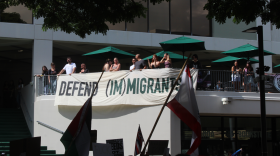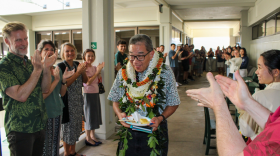For the last 50 years, we have seen the University of Hawaiʻi Cancer Center grow.
Dr. Naoto Ueno took over as its executive director more than a year ago and has been working intently on the center's future. Also a two-time cancer survivor, he has spent the last three decades at the University of Texas MD Anderson Cancer Center.
There is nothing like coming face-to-face with your mortality to spark your passion and to fill the time you have left with it. He feels very strongly about the disparity in our health care system and was candid about his experience.

"The problem of cancer treatment is that there are certain things that's really black and white, but there's a lot of gray zone, or even there's no information. So in my case, there was no clarity. So that's where research becomes really important," Ueno said.
His first cancer diagnosis was sarcoma in the soft tissue of his thigh. He was then diagnosed with myelodysplastic syndrome, which can lead to leukemia.
"The first cancer was about unknown, right. But the second cancer was about new treatment development. So when I went through the diagnosis of MDS, I did try a new type of cancer treatment with clinical trials, I was hopeful. It didn't work out, but I was very appreciative that I had the opportunity to try something new," he said.
He ended up opting for a stem cell transplant seven years ago to treat his MDS. One of the chemotherapies he received for the transplant happened to be a drug he worked on as a physician almost two decades prior.
"Having that drug, the regimen I received, I truly have the appreciation for my survival — is quite dependent on what I was involved in the past," he said.
The UH Cancer Center recently renewed its National Cancer Institute designation, which it has maintained since 1996. A press release said that only 72 cancer centers in the U.S. are recognized by the federal agency.
"It really reflects that we provide high quality of research, and our research is impacting the community and the patient, and it's reflected by our physicians who provide care working with the health care system that we have, particularly like Queen's Health Systems or Hawaiʻi Pacific Health," Ueno said.
The center has an ambitious plan to begin offering early-phase clinical trials next fall so patients don't have to travel to the continent.
"You want to give that choice, the best care or clinical trials, and that's what people should be exposed to," he said.
This interview aired on The Conversation on Nov. 12, 2024. The Conversation airs weekdays at 11 a.m. on HPR-1.





